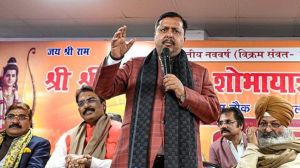The 145;secular146; double-speak
When George Orwell invented the word double-speak, he must have kept our Leftists and their 8216;8216;natural allies8217;8217; , self-st...

When George Orwell invented the word double-speak, he must have kept our Leftists and their 8216;8216;natural allies8217;8217; , self-styled secularists, in view. In any case, the title of Orwell8217;s novel 1984 closely coincides with the first double-speak of secularism when the Congress was in power at the Centre. A pogrom against Sikhs was perpetrated and the party cynically exploited the sympathy wave over the killing of Indira Gandhi to its electoral advantage.
Now they are turning around to condemn the BJP for advising Modi to seek a fresh mandate in Gujarat. The Chief Minister is accused of handling the situation criminally bad, which necessitates an immediate sacking. The accusation may or may not be true. Who will sit in judgment? It could either be the ruling party8217;s leadership or the state legislature or the people in the state. But definitely not the media or the Opposition, which normally operates from the comfortable air-conditioned offices in New Delhi.
The accused Chief Minister offered to resign but his party, after taking all things into consideration, did not accept his offer and advised him to seek a fresh mandate from the electorate. Is seeking a fresh mandate anti-democratic? It is all right when Rajiv Gandhi sought a mandate from a traumatised nation after Indira Gandhi8217;s murder and the massacre of Sikhs. But it is wrong for Narendra Modi to go back to people in a situation where anti-national forces are constantly snapping at his heels, all equipped to provoke communal riots, bombings, smuggling of arms and drugs and a section of the society is too willing to play the fifth column8217;s role. If this is not double-speak, what else is?
The dyed-in-the-wool secularists are alleging that elections cannot be held when over a lakh of people are living in relief camps and the communal cauldron is boiling. The relief camps, for one thing, are not spread all over the state; they are confined to two cities only. The situation in the state, outside these two cities, has regained near normalcy. The critics of Modi have a chance to take their case to the people and let the people decide. Elections have been held in different parts of this country in worse circumstances. Let us list them for the benefit of the secularists:
Ever since 1989, the law and order situation in J038;K has been on the boil. Daily killings have become common place now. Bandhs and other demonstrations are taking place every alternate day. Yet, J038;K has had several elections. Elections can be held in a state where members of one community are being killed almost every day by terrorists leading to communal cleansing in the Valley and the Army is keeping a lynx-eyed vigil. What is then wrong in holding elections in Gujarat, where the Army is deployed only in some pockets and on a purely temporary basis, unlike in J038;K where it has been there for 12 years maintaining internal security?
But these are not the only events that expose secularists8217; double-speak. Go back to Assam of 1983. There were a series of violent riotings and killings in that state on the issue of Bangladesh infiltration. The Centre had to even dismiss the state government and take up maintenance of law and order in its own hands. Still, the riots continued and Assamese, Bengalis, tribals were being killed. Indira Gandhi declared elections in the midst of all these, and the All Assam Students8217; Union boycotted the elections.
The killings intensified. The polls witnessed less than 20 per cent turnout. Yet Indira Gandhi hailed the elections as a popular mandate for her party. How did the Congress call for state elections on the dead bodies of the Assamese and others?
What happened in Nelli? How may people were hacked to death at Mangaldoi? The killings had been continuing for almost six months before the elections were declared and even during the polls.
If the 8216;8216;secularists8217;8217; stand exposed in regard to the Modi affair, they are forcing themselves into a tight corner in their criticism of the Prime Minister over his recent speech in Goa. The secularists had applauded when the Prime Minister had made a remark at a recent book release function in Delhi distancing himself from certain aspects of Hindutva. But the moment he touched Muslim fundamentalism at Panaji, their raw nerves were touched.
And now he is pilloried as a RSS man. But when did Vajpayee say he did not belong to the RSS? And what did he say at Goa for which is being hauled on the coals? He had decried the provocation at Godhra, which led to riots in the rest of Gujarat. He also recalled his recent visit to South-East Asia and talks with some Islamic heads of state.
Malaysia, for instance, is an Islamic country where Muslims constitute 51 per cent of the population. But what is this Islamic country facing right now? Threat from fundamentlist Islamic movements. Time magazine in four recent issues has focused on this threat. The Malaysian police is still searching for some 200 activists of a fundamentalist movement with its origins in Indonesia. The information about them has come from the documents captured in Afghanistan by the US forces.
The same documents helped neighbouring Singapore prevent a 1993 Mumbai-like serial blast just in time. In Indonesia, President Megawati Sukarnoputri is willing to cooperate with US agencies to unearth the fundamentalist group that has spread its tentacles from the country into Malaysia, Thailand and the Philippines. In the Philippines, the secessionist forces and fundamentalist forces have combined because both derive their inspiration from the local Muslim population.
These are irrefutable facts. Secularist icing cannot hide the sharp edges of these dragon seeds. Vajpayee is not the only political leader who has referred to these threats. Some of the Muslim political leaders of S-E Asia themselves are admitting the danger.
Islamic fundamentalism poses a danger to global peace today and the international community is alive to the danger. By taking on the Prime Minister on this issue, the 8216;8216;Secular8217;8217; pack has knowingly or otherwise extended a lifeline to those who pose a threat to civil society and democratic polity. But then the dividing line between Islamic fundamentalism and 8216;8216;secularism8217;8217; has blurred in this country for a long time now.
Can there be a different yardstick for those living in Gujarat and the rest of the country? A big 8216;No8217; as an answer can ensure restoration of enduring peace in the disturbed state.
- 01
- 02
- 03
- 04
- 05































